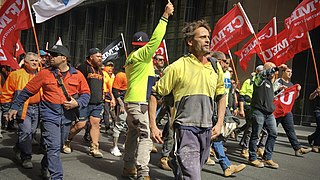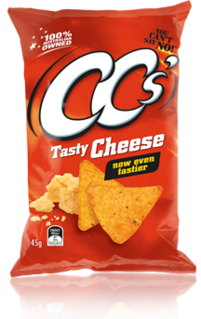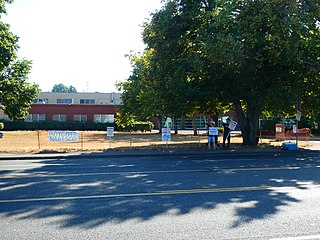Related Research Articles

The Labor Management Relations Act of 1947, better known as the Taft–Hartley Act, is a United States federal law that restricts the activities and power of labor unions. It was enacted by the 80th United States Congress over the veto of President Harry S. Truman, becoming law on June 23, 1947.

Strike action, also called labor strike, labour strike, or simply strike, is a work stoppage, caused by the mass refusal of employees to work. A strike usually takes place in response to employee grievances. Strikes became common during the Industrial Revolution, when mass labor became important in factories and mines. As striking became a more common practice, governments were often pushed to act. When government intervention occurred, it was rarely neutral or amicable. Early strikes were often deemed unlawful conspiracies, or anti-competitive cartel action and many were subject to massive legal repression by state police, federal military power, and federal courts. Many Western nations legalized striking under certain conditions in the late 19th and early 20th centuries.

Picketing is a form of protest in which people congregate outside a place of work or location where an event is taking place. Often, this is done in an attempt to dissuade others from going in, but it can also be done to draw public attention to a cause. Picketers normally endeavor to be non-violent. It can have a number of aims, but is generally to put pressure on the party targeted to meet particular demands or cease operations. This pressure is achieved by harming the business through loss of customers and negative publicity, or by discouraging or preventing workers or customers from entering the site and thereby preventing the business from operating normally.

The Smith's Snackfood Company is a British-Australian snack food company owned by American multinational corporation PepsiCo. It is best known for its brand of potato crisps. The company was founded by Frank Smith and Jim Viney in the United Kingdom in 1920 as Smiths Potato Crisps Ltd, originally packaging a twist of salt with its crisps in greaseproof paper bags which were sold around London. The dominant brand in the UK until the 1960s when Golden Wonder took over with Cheese & Onion, Smith’s countered by creating Salt & Vinegar flavour which launched nationally in 1967.
Cheezels, a brand name created for APT snack company in 1970 by Masius account exec Ken Farrington, are a type of ring-like, corn-based, cheese-flavoured Australian snack food.
Snack Brands Australia (SBA) is one of the largest suppliers of snack foods in Australia and acts as the main competitor to the long established The Smith's Snackfood Company.

CC's is an Australian brand of flavoured tortilla chips produced since the early 1980s, originally by The Smith's Snackfood Company, and currently by Snack Brands Australia. CC's are predominantly sold in Australia and come in assorted flavours. CC's were also sold in New Zealand until Bluebird Foods decided to locally produce the American brand Doritos in March 2010. However, the CC's brand returned to New Zealand shelves for a limited run in 2019. CC's are 100% Australian manufactured.
The Grunwick dispute was a British industrial dispute involving trade union recognition at the Grunwick Film Processing Laboratories in Chapter Road, Dollis Hill in the London suburb of Willesden, that led to a two-year strike between 1976 and 1978.

Retail, Wholesale and Department Store Union, Local 558 v Pepsi-Cola Canada Beverages (West) Ltd, 2002 SCC 8, is a leading Supreme Court of Canada decision on secondary picketing. The Court held that at common law, secondary picketing is legal so long as there is no criminal or tortious conduct.
The Mudginberri abattoir was the focus of a major industrial relations dispute from 1983 to 1985 in Australia's Northern Territory which was notable for being the first successful use of legal sanctions against a union since the gaoling of Victorian Tramways union leader Clarrie O'Shea in 1969. The successful prosecution of the Australasian Meat Industry Employees Union (AMIEU) under section 45D of the Trade Practices Act was seen by the National Farmers Federation and the developing New Right in and outside the Liberal Party of Australia as a breakthrough in a campaign to break the power of the unions and introduce contract employment.

Lolly Gobble Bliss Bombs are an Australian snack food made by the Greens food company.

Arnott's Biscuits Limited is Australia's largest producer of biscuits and the second-largest supplier of snack food. Founded in 1865, it is a subsidiary of KKR.
The Remington Rand strike of 1936–1937 was a strike by a federal union affiliated with the American Federation of Labor (AFL) against the Remington Rand company. The strike began in May 1936 and ended in April 1937, although the strike settlement would not be fully implemented until mid-1940.
The Dollar Sweets dispute in 1985 was a small industrial dispute with major legal ramifications in industrial relations where an employer resorted to a common law verdict and damages in a case in the Supreme Court of Victoria to resolve a dispute after industrial courts proved ineffective. It was the first time a trade union was forced to pay common law damages to an employer for losses suffered through picketing in Australia. The dispute was also significant for boosting the career of the barrister representing the company, Peter Costello, leading him to stand for federal Parliament and become Treasurer in the Howard Government.

Franklin Bechly (1873-1965) was Iowa 6th District Judge from 1927 to 1959. Judge Bechly presided during the 1938 Maytag Corporation labor dispute. The strike by UE Local 1116 was a test of the National Labor Relations Act of 1935 against the back-to-work movement of the Maytag Corporation. The Governor of Iowa declared martial law in Newton, Iowa to break the strike, and Judge Bechly continued to preside until agreements were reached and martial law was lifted.
When union violence has occurred, it has frequently been in the context of industrial unrest. Violence has ranged from isolated acts by individuals to wider campaigns of organised violence aimed at furthering union goals within an industrial dispute.
The Empire Zinc strike, also known as the Salt of the Earth strike, was a 15-month-long miners' strike in Grant County, New Mexico against the Empire Zinc Company for its discriminatory pay. The strike drew national attention, and after it was settled in 1952, a movie entitled Salt of the Earth (1954) was released that offered a fictionalized version of events.
The Confectionery Workers' Union of Australia (CWUA) was an Australian trade union which existed between 1925 and 1992. Until 1986, it was known as the Federated Confectioners' Association of Australia (FCA). Throughout its existence, it represented factory workers in the confectionery industry, including a high proportion of women. It was also notable for its involvement in the landmark Dollar Sweets Dispute.

The 2021 Nabisco strike was a labor strike involving workers for the American snack manufacturer Nabisco, a subsidiary of Mondelez International. The strike began at a Nabisco facility in Portland, Oregon on August 10 and over the next few days spread to several more Nabisco facilities throughout the United States.
The 1985–1987 Watsonville Cannery strike was a labor strike that involved over 1,000 workers at two food processing facilities in Watsonville, California, United States. The facilities were owned by Watsonville Canning and Richard A. Shaw Inc., two of the largest frozen food processors in the United States, while the workers were all union members of the International Brotherhood of Teamsters (IBT) Local 912. The strike began on September 9, 1985, and completely ended about 18 months later, on March 11, 1987.
References
- ↑ "Arnott's in $250m bid for Snack Foods". Australian Financial Review. 6 June 2002. Retrieved 8 September 2020.
- ↑ THE REAL McCOY BUYS ARNOTT’S SALTY SNACK FOODS
"The Real McCoy Snackfood Company - Latest News". Archived from the original on 18 July 2008. Retrieved 3 July 2013. - ↑ Snackbrands Australia, "Snack Brands Australia - About Us". Archived from the original on 21 April 2009. Retrieved 19 May 2009.
- ↑ "Sweet talking with an eye on export". The Sydney Morning Herald. 13 September 2007. Retrieved 8 September 2020.
- ↑ Kelly, Paul (December 1994). The End of Certainty: Power, Politics, and Business in Australia. Allen & Unwin. ISBN 978-1-86373-757-9.
- 1 2 "Dollar Sweets Pty Ltd v Federated Confectioners Association of Australia [1986] VicRp 38; [1986] VR 383 (12 December 1985)". www.austlii.edu.au. Retrieved 26 November 2018.